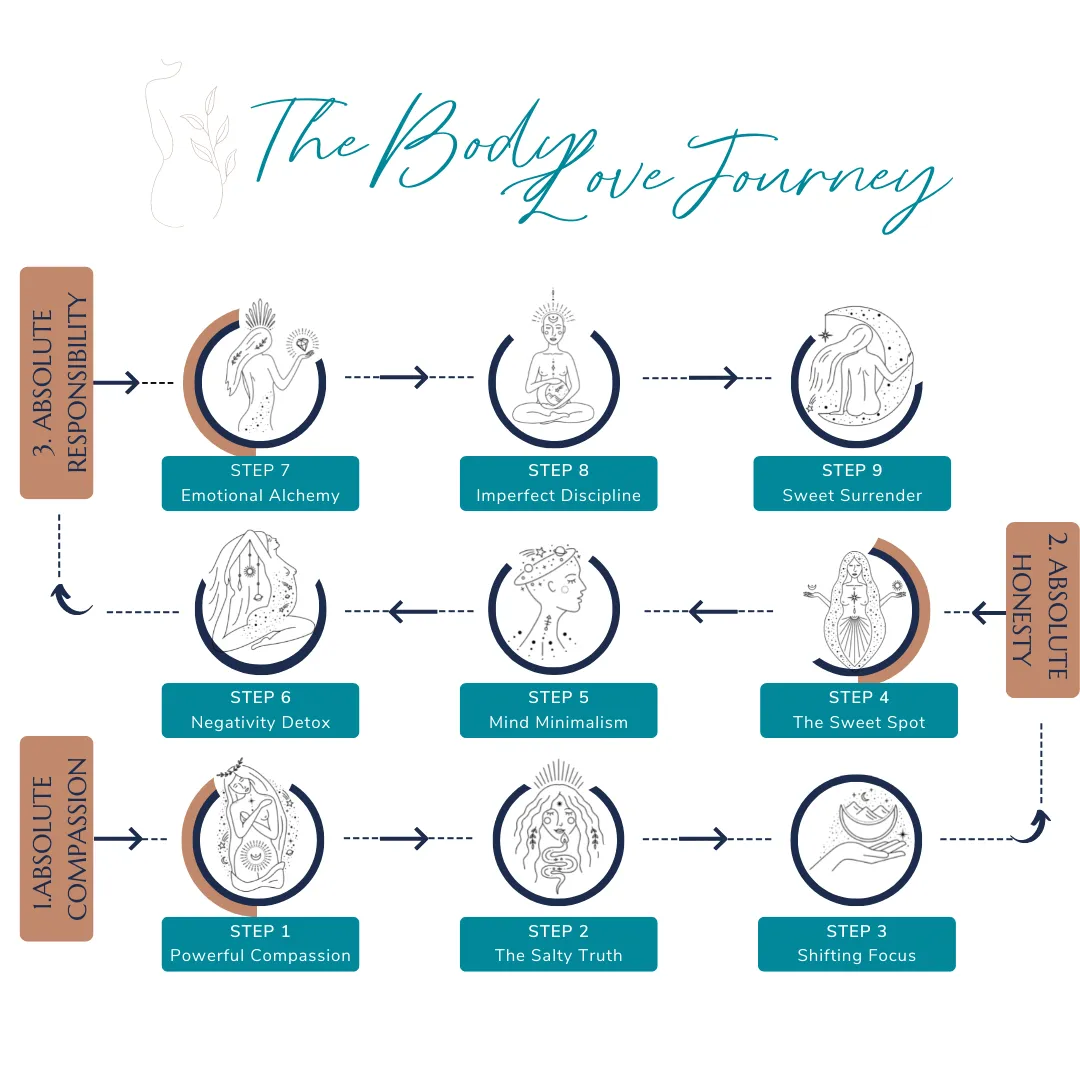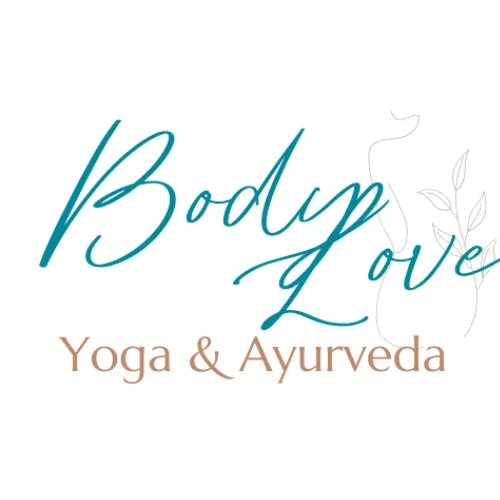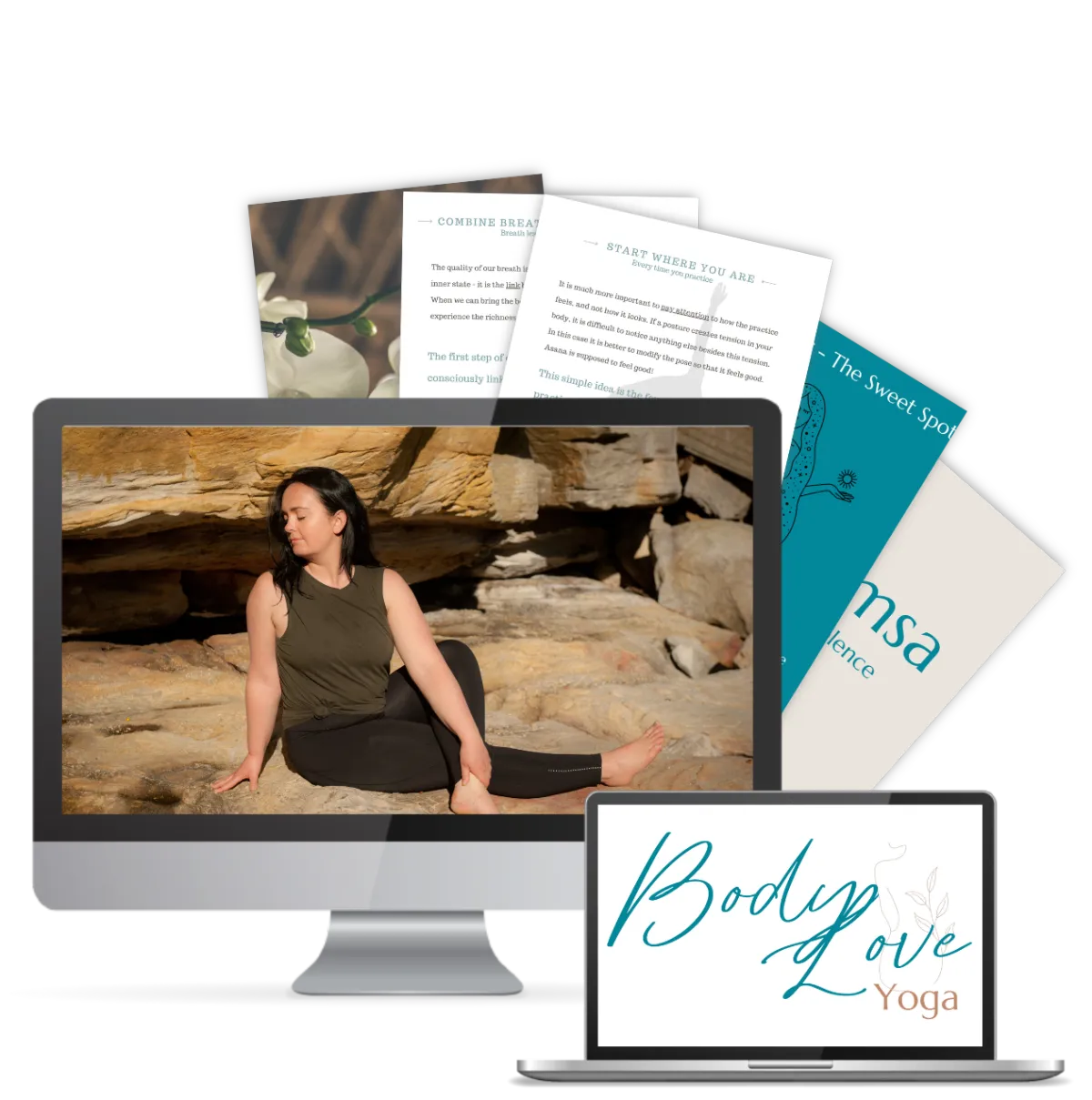Body Love Yoga
An online group yoga therapy program sharing the practices and philosophy of yoga and ayurveda to overcome emotional eating and develop a positive relationship with your body

Module One - Powerful Compassion
This module is based on the yogic concept of
Ahimsa or non violence. The yogis tell us that our actions can be traced back to four main areas - fear, powerlessness, low self regard or imbalance. So feeling out of control around food, or to not yet have developed a respectful and loving relationship with our bodies can be traced back to one of, or a combination of these 4 areas, and it is only through compassion that you can really reconnect to your power.
The Experience:
An asana practice designed to embody the felt sense of stability and grounding as a solid foundation to build body love from the ground up
Explore the dance of acceptance and change
Find the balance point of your triggers by tapping into the opposite energy
Trace your actions back to the beginning
The Experience:
An interoceptive practice to access the truth that resides in the body
Look beneath the surface level of desires into what you are actually trying to experience
Move from self objectification to real body love and finding your flow
Integrating the felt sense of belonging in this body practice by practice
Module Two - The Salty Truth
This module is based on the yogic concept ofSatya
or truth. Truth resides in the body, and it is the mind that can come in and override it. We will reconnect to the feelings of expansion and contraction in the body, and explore how listening to and acting on the wisdom of the body builds feelings of self worth and trust within ourselves, lessening the need to use food to avoid discomfort. We embrace our shadow selves as part of nature, and explore truthful self expression which frees up energy that would otherwise go into binge eating.
Module Three - Shifting Focus
This module is based on the yogic concept of
Asteyaor non stealing. It is a practice of taking the larger view, and looking at all the things that you do have, instead of being pulled into believing that you are not enough. Feelings of lack are transformed into feelings of abundance when we turn our attention inwards, away from comparison and social conditioning, and instead embrace the beauty in your own unique unfolding. As we start to feel whole, the body and mind come into alignment, and integrity is developed. An inward focus helps you to keep coming back to your own source of inner fulfilment and simply sharing it, rather than try to find fulfilment in anything outside of ourselves.
The Experience:
A practice to build your energetic container through breath, bandha (energetic lock) and movement to embody a sense of "enoughness"
Shifting the perspective that positive body image is not believing that the body looks good, but believing and feeling that the body is good, regardless of what it looks like
An exploration of what need has not been met that leads to emotional eating
Bringing your gaze back to what you have, and owning the fullness of you
The Experience:
Practical tools for understanding physical versus emotional hunger cues
An asana practice focused on the sweet spot of Stirha (effort) and sukha (ease) to enable a sense of ease in challenges both on and off the mat
Connection to the creative force within you that leads you away from self destructive habits
Access to deeper rest when not ruled by outside forces, and instead enjoy the body from the inside out.
Module Four - The Sweet Spot
Based on the yogic concept of Brachmacharya
or non excess. The core of this module is a remembering and a connection to the creative force within us. Actions that are coming from our creative spark will not lead us to overindulgence. If you are following that you won't spend a lot of time in situations where you are not aligned. Addictive self destructive patterns lessen. The result is that you only eat to the point of increased energy, not to the point of lethargy. You move to the point of feeling alive and building confidence not to exhaustion, or to feel that you have made up for bingeing. Life becomes directed by creative flow.
Module Five - Mind Minimalism
This module is based on the yogic concept of Aparigraha or non grasping. This is a very powerful practice showing that you gain more and more freedom by letting go of attachment to the senses by understanding the four functions of the mind. It is really about presence and being open to what life is offering us moment to moment. The result is that when you have a pleasurable experience you don't try to grasp that - you move on to the next moment with ease and curiosity.
What we try to possess possesses us. By letting go of trying to possess the "perfect body" you also let go of other people's opinions and find real self worth.
The Experience:
The choice between your attachments and your happiness
As asana practice exploring the theme of appreciation and of letting go
Embracing changes in the body as the evolution of nature
Freedom from perfectionism
The Experience:
Align thought, speech and action
Taking stock of what is nourishing you and what is not
Active listening
Gathering all the scattered pieces of ourselves
Module Six - Negativity Detox
This module is based on the yogic concept of Saucha
or purity. It is a clean up off everything that is unforgiven in us, to create space for clarity on our deepest intentions. Delve into energetic practices to gather all the scattered pieces of yourself, so that you can direct your energy into actions that are nourishing and aligned with who you are becoming.
Module Seven - Emotional Alchemy
This module is based on the yogic principle of
Santosha or contentment, which teaches that it is this continued longing that keeps contentment just out of our grasp. We invite contentment into the present moment instead of always getting ready to live, or getting ready to be happy. It is in the present moment that we have a window of opportunity into contentment.
The Experience:
Connect to inner fulfillment rather than external craving
An asana practice of relaxing in and receiving
Practices to strengthen present moment awareness
Move from a state of lack to a feeling of having and being enough
The Experience:
Asana practice accessing the fire element in the body
An exploration of what it means to be disciplined
Remembering Sankalpa - our deepest intention
Small consistent actions to return to the rhythm of the body
Module Eight - Imperfect Discipline
This module is based on the yogic concept of Tapas
or discipline. Tapas is your internal fire, which you build with small consistent action. When you approach tapas with daily devotion, then nourishing and moving your body properly becomes an act of great self kindness. It is showing up for yourself in different ways as you transform what deludes you so that you can return to the rhythm of the body and breath. It is a sweet and consistent endeavor, not a punishing or repressive discipline that we can often enforce on ourselves.
Module Nine - Sweet Surrender
Based on the yogic concepts of Svadhyaya(self study), and Ishvara Pranidhana (surrender), this final module clears away any misperceptions on how you may see yourself. We are often controlled by our limiting beliefs which are called samskaras in yoga philosophy. They are described as grooves in the mind caused by past experience. As you develop the witness mind, you create more space between stimulus and response, so that you can meet each moment of life with full awareness, presence, curiosity and peace.
The Experience:
Develop the witness mind
Untangling self limiting beliefs
Practices to calm the fluctuations of the mind
Aligning your attention to what you want to experience

You Will Receive
2 private 1:1 yoga therapy consultations
Step-by-step online content
Weekly live yoga therapy group class and discussion
Personalised yoga practices for your daily sadhana
Ayrvedic recipes for your dosha
Investment $900
Payment Plan Also Available

Frequently Asked Questions
How much time do I need to set aside each week?
During the 9 week period of the program, I recommend an average of 1 - 2 hours per week on the online content. We will also have a weekly 90 minute live call. You will have access to all content for 12 months after the program ends so you can complete this at a slower pace if you wish.
Do you provide meal plans and/or nutrition advice?
As part of your initial yoga therapy consultation we will assess your dominant dosha and any imbalances. This will help to determine which foods will help you to restore balance. I will provide ayurvedic recipes aligned to your dosha to help simplify, and to remove food stress. This can begin with a meal plan if that is helpful for you, leading ultimately to you listening to your own inner guide.
How long will I have access to the online content for?
You will have access to the online membership area for 3 months after the 9 week program finishes. Your personalised practices and recipes will be downloadable for you to keep.
Will the live sessions be recorded in case I can't make a live call?
All parts of the course can be done flexibly, at your convenience. The group yoga therapy classes and discussions will be recorded so you can watch them at a time that suits you. If you can’t make a live class, you can email your questions and they will be answered on the call for when you can watch the recording.
FAQS
What should I wear to yoga class?
You should wear comfortable, breathable clothing that allows you to move freely. Some people prefer to wear loose-fitting clothing, while others prefer to wear more fitted clothing. It is also a good idea to wear shoes or socks that have good traction, as you may be moving on a slippery surface.
Do I need to be flexible to do yoga?
No, you do not need to be flexible to do yoga. Yoga is a practice that is suitable for all people, regardless of their fitness level or flexibility. There are many different types of yoga, and you can find one that is right for you.
What are the benefits of yoga?
Yoga has many benefits for both the body and the mind. Yoga can help to improve your flexibility, strength, and balance. It can also help to reduce stress, anxiety, and depression. Yoga can also help to improve your sleep quality and boost your mood.
